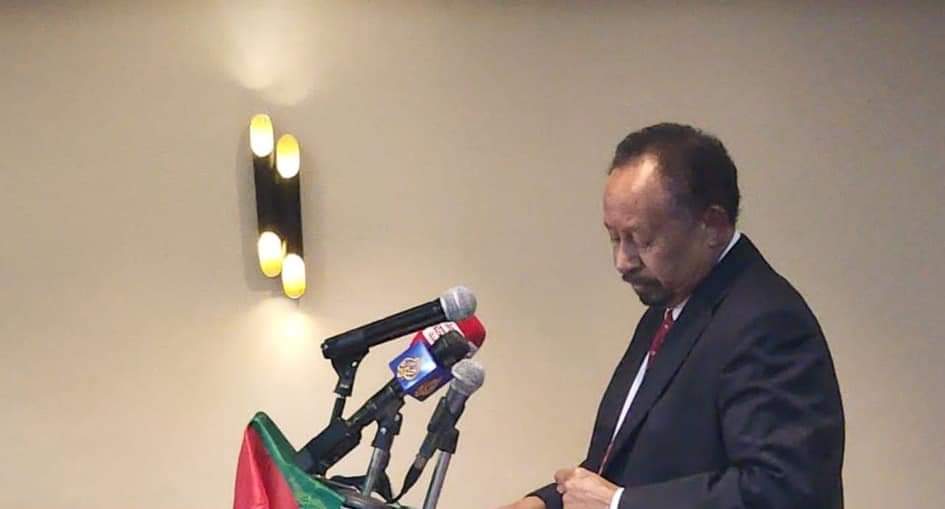Civil Front to Stop the War in Sudan takes shape as Saudi Arabia welcomes resumption of Jeddah talks

Abdallah Hamdok was chosen as chair of the the Civil Front to Stop the War (CFSW), Addis Ababa, October 26, 2023 (Photo: CFSW)
Saudi Arabia welcomed the resumption of negotiations between the warring Sudan Armed Forces (SAF) and the Rapid Support Forces (RSF) in Jeddah yesterday. The preparatory committee for the Civil Front to Stop the War in Sudan, which convened in the Ethiopian capital Addis Ababa this week, has selected former Prime Minister Abdallah Hamdok as chairperson.
The Saudi Ministry of Foreign Affairs in a statement yesterday welcomed the resumption of talks between representatives of the Sudan Armed Forces (SAF) and the Rapid Support Forces (RSF) in the Saudi city of Jeddah yesterday. The Jeddah negotiation platform is facilitated by Saudi Arabia and the USA, in partnership with the African Union and the Intergovernmental Authority for Development (IGAD) in the Horn of Africa.
The SAF and the RSF should resume what was agreed upon in the Jeddah Declaration for the Protection of Civilians on May 11 and in the ceasefire agreement signed by both parties in Jeddah on May 20.
The Saudi FA Ministry affirmed its keenness on “maintaining a united front”, and the importance of “giving precedence to wisdom and stopping the conflict to alleviate the suffering of the Sudanese people”.
The head of the National Umma Party (NUP) commented that the decision of the SAF and the RSF to return to the Jeddah platform and resume negotiations “deserves praise and support”.
Describing it as an important step, he said it “will lay the right foundations for sustainable peace by addressing and resolving the root causes of conflicts”.
Abdallah Hamdok, former prime minister in the transitional period between 2019-2021, welcomed the launch of the new Jeddah round of talks and the arrival of the SAF and RSF delegations yesterday.
In his first statement after being chosen as head of the preparatory committee of the Civil Front to Stop the War in Sudan yesterday, he praised the efforts made by Saudi Arabia, the USA, the African Union, and IGAD, to stop the war, and called on both parties to show political will for “a solution that will stop the fighting, address the humanitarian catastrophe, and save our country from the dangers of division”.
Hamdok appealed to the parties to the conflict “to facilitate the arrival of urgent humanitarian aid and also the visa entry procedures for humanitarian workers to those in need throughout the country. I further appeal to the international community to urgently mobilise humanitarian support”.
Civil Front to Stop the War
The preparatory meeting for the Civil Front to Stop the War, which concluded its work yesterday, ended with the formation of a 60-member preparatory leadership committee headed by Hamdok to “carry out oversight and supervisory tasks, and follow up on the preparation for the founding conference”.
According to its “final statement” yesterday, the preparatory meeting decided to convene the conference within two months, with the participation of around 1,000 people. It also resolved to establish a “coordinating executive office and a preparatory committee”.
The agreement allocated 70 percent of all levels of the temporary structure to non-partisan forces and designated 30 percent for “political forces and rebel movements”. 30 percent of the conference seats have been reserved for women.
Furthermore, “the meeting designated 200 members in the conference to represent the various community and social groups in the country, including pastoralists, farmers, clergy, native administration leaders, displaced people and refugees”.
On the humanitarian front, the meeting recommended establishing connections among working organisations and donors to facilitate relief delivery in Chad, South Sudan, and other neighbouring countries hosting Sudanese refugees. It was proposed that aid organisations enter into separate agreements with the SAF and the RSF to streamline and oversee relief distribution, and that airports be opened solely for humanitarian operations.
The statement further underscored the importance of agreeing on a “hybrid relief operation that spans conflict lines, provided that the operation is monitored by the Jeddah platform”. The meeting also suggested providing “direct cash aid” to people displaced by the conflict and establishing channels for aid delivery and participation.
On the economic front, the conference recommended “dismantling the war economy, initiating rebuilding efforts, and returning to the transitional programmes”.











 and then
and then